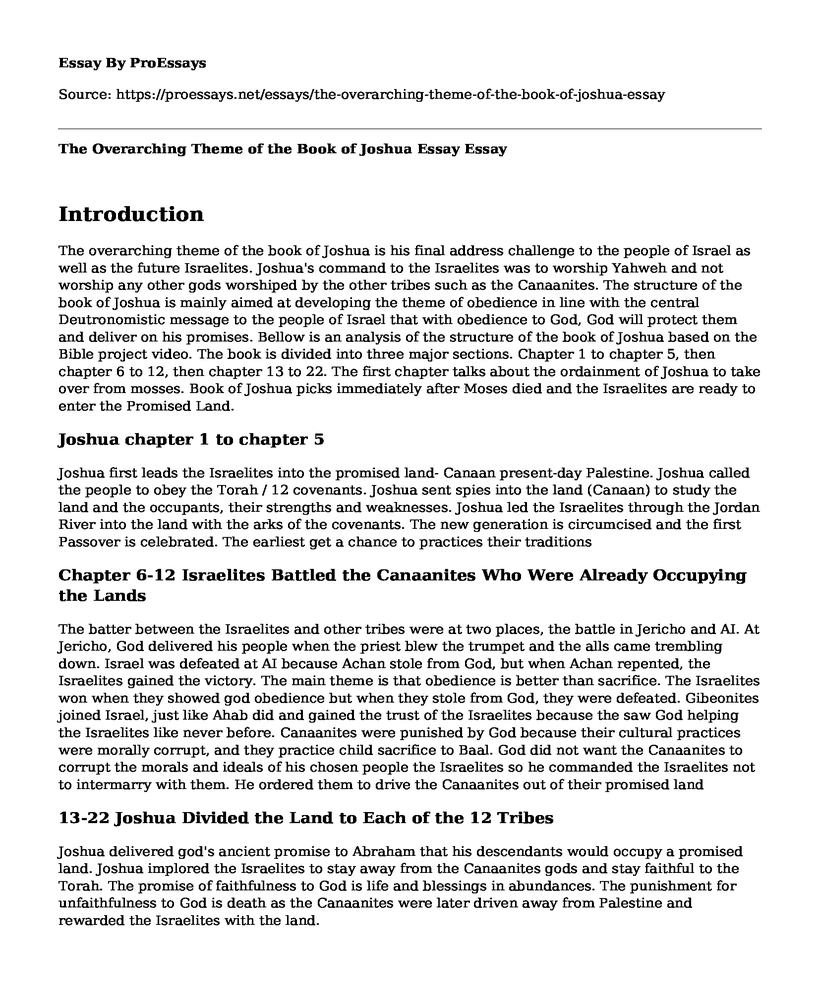Introduction
The overarching theme of the book of Joshua is his final address challenge to the people of Israel as well as the future Israelites. Joshua's command to the Israelites was to worship Yahweh and not worship any other gods worshiped by the other tribes such as the Canaanites. The structure of the book of Joshua is mainly aimed at developing the theme of obedience in line with the central Deutronomistic message to the people of Israel that with obedience to God, God will protect them and deliver on his promises. Bellow is an analysis of the structure of the book of Joshua based on the Bible project video. The book is divided into three major sections. Chapter 1 to chapter 5, then chapter 6 to 12, then chapter 13 to 22. The first chapter talks about the ordainment of Joshua to take over from mosses. Book of Joshua picks immediately after Moses died and the Israelites are ready to enter the Promised Land.
Joshua chapter 1 to chapter 5
Joshua first leads the Israelites into the promised land- Canaan present-day Palestine. Joshua called the people to obey the Torah / 12 covenants. Joshua sent spies into the land (Canaan) to study the land and the occupants, their strengths and weaknesses. Joshua led the Israelites through the Jordan River into the land with the arks of the covenants. The new generation is circumcised and the first Passover is celebrated. The earliest get a chance to practices their traditions
Chapter 6-12 Israelites Battled the Canaanites Who Were Already Occupying the Lands
The batter between the Israelites and other tribes were at two places, the battle in Jericho and AI. At Jericho, God delivered his people when the priest blew the trumpet and the alls came trembling down. Israel was defeated at AI because Achan stole from God, but when Achan repented, the Israelites gained the victory. The main theme is that obedience is better than sacrifice. The Israelites won when they showed god obedience but when they stole from God, they were defeated. Gibeonites joined Israel, just like Ahab did and gained the trust of the Israelites because the saw God helping the Israelites like never before. Canaanites were punished by God because their cultural practices were morally corrupt, and they practice child sacrifice to Baal. God did not want the Canaanites to corrupt the morals and ideals of his chosen people the Israelites so he commanded the Israelites not to intermarry with them. He ordered them to drive the Canaanites out of their promised land
13-22 Joshua Divided the Land to Each of the 12 Tribes
Joshua delivered god's ancient promise to Abraham that his descendants would occupy a promised land. Joshua implored the Israelites to stay away from the Canaanites gods and stay faithful to the Torah. The promise of faithfulness to God is life and blessings in abundances. The punishment for unfaithfulness to God is death as the Canaanites were later driven away from Palestine and rewarded the Israelites with the land.
Conclusion
From the structure, there is only one conclusion. The conclusion that God will only protect the obedient because obedience is better than sacrifice. God protected the Israelites as long as they remained obedient to the Torah and remained faithful to him. However, disobedience leads to ruin as God allowed the Israelites to be defeated by the AI. God abhors sin and unfaithfulness that is why he ordered Israelites to dive the Canaanites from their ancestral land and gave it to the 12 tribes.
Cite this page
The Overarching Theme of the Book of Joshua Essay. (2022, Aug 15). Retrieved from https://proessays.net/essays/the-overarching-theme-of-the-book-of-joshua-essay
If you are the original author of this essay and no longer wish to have it published on the ProEssays website, please click below to request its removal:
- Proof for the Existence of God
- Essay Sample on Buddhism And the Law of Karma
- Essay Sample on Dalai Lama Thoughts On Why Humans Should Practice Universal Compassion
- Buddhism and Modern Capitalist Development in Thailand Essay
- Essay Sample on Comparing Christianity and Islam: A Historical Overview
- Essay Example on My Spiritual Journey: Meditation and Reflection
- Essay Example on Buddhism: No God, No Punishment, Just Dharma Reality







